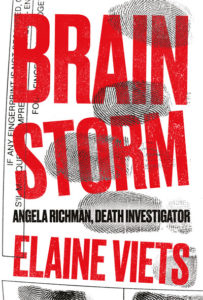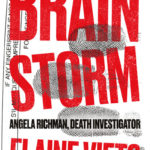By Elaine Viets
Mysteries give us more than a cracking good story. They give us the justice we can’t get in real life. Consider what happened to me:
 Brain Storm is my new Angela Richman death investigator mystery. Like me, Angela went to the ER after four days of blinding migraines. Angela and I didn’t go to any hick hospital. Oh, no. Our temple of healing proclaimed itself one of the “50 best hospitals” in America. The neurologist on call was a respected and honored physician. He told Angela – and me – that we were “too young and fit to have a stroke,” then ordered us to come back four days later for a PET scan.
Brain Storm is my new Angela Richman death investigator mystery. Like me, Angela went to the ER after four days of blinding migraines. Angela and I didn’t go to any hick hospital. Oh, no. Our temple of healing proclaimed itself one of the “50 best hospitals” in America. The neurologist on call was a respected and honored physician. He told Angela – and me – that we were “too young and fit to have a stroke,” then ordered us to come back four days later for a PET scan.
Never happened. Angela and I had six strokes, including a hemorrhagic stroke, and were hauled back to the hospital. The ER doc told my husband I’d be dead by morning. The paramedics said, “Sorry about your wife, man.” But a brash brain surgeon said he could save us, and he did. Angela and I were in a coma for a week, and spent three months in the hospital. It took me nearly four years to fully recover.
During that recovery, Angela and I were buried under an avalanche of bills. We discovered that top-ranked hospital excelled at billing scams. The billing office charged Angela and me $3,000 for a hysterectomy we didn’t have. I can’t tell you how many blood tests or X-rays I had in the hospital, but a womb is a body part a woman keeps track of.
And that’s where our stories diverge. The truth, I’m sorry to say, is far less satisfying than fiction. If you want to write accurate mysteries, you need to know what happens in real life. Then you can decide how realistic you want to make your fictional world.
The hospital was indicted for scamming me, right?
Nope, they’re still ripping off patients. When I saw the insurance company’s Explanation of Benefits (EOB), I called the hospital billing office, figuring they’d made an honest mistake. I told the BO woman,”You’ve billed me $3,000 for a hysterectomy. I was in for brain surgery. Wrong end.”
Ms. BO said, “Oh, honey, we didn’t bill you. We billed your insurance company.”
Wrong answer, sweetheart. I wrote a letter to every member of the hospital board and then filed a complaint with the insurance company. The insurance company requested a copy of every paper, record, and file with my name on it. The paperwork filled a double-wide copy-paper box. The hospital removed the names of their board members from their Website. If you call and ask for the board’s names, they won’t tell you.
In Brain Storm, the feds come down on that hospital like a ton of bedpans, and lawsuits popped up like dandelions on a spring lawn.
 The brain surgeon who saved my life was commended by the hospital and the neurologist who misdiagnosed me was suspended and lost his privileges to treat patients.
The brain surgeon who saved my life was commended by the hospital and the neurologist who misdiagnosed me was suspended and lost his privileges to treat patients.
Nope. In real life, the doctor who misdiagnosed me is still a respected physician at that same hospital. In his spare time, he happily testifies on behalf of insurance companies. His colleagues refused to testify against him. I hope he’s on call if they show up at the ER with stroke symptoms.
The brain surgeon who saved my life was banished from the hospital. Granted, Dr. Tritt, as I call the brain surgeon in Brain Storm, didn’t have the best bedside manner: He confessed that when I was in a coma he’d come into my room at night and say, “Elaine! Wake up! This is God!” The nurses made him quit. But hey, the man saws open skulls for a living and he did an incredible job when he opened mine.
In Brain Storm, Dr. Tritt is rewarded and I kill the doctor who misdiagnosed me. I wish his death wasn’t so quick. He should have suffered more.
 So why didn’t I sue the bastard who misdiagnosed me?
So why didn’t I sue the bastard who misdiagnosed me?
It’s not that easy. Remember this when you write your novels: It’s hard to sue doctors and win. I went to every malpractice lawyer in South Florida, from Palm Beach to Miami, and then consulted out-of-state attorneys.
The main problem? I’d made too good a recovery. I didn’t look or sound damaged. I could walk, talk, and write again. “Now if you’d died,” one lawyer told me, “we would have had one hell of a case.”
Excuse me for living.
888888888888888888888888888888888888888888888888888888888888888888888
 “Haunting and creepy, with a fast-paced twisty plot, and a protagonist you will not soon forget – this is Elaine Viets at her most deliciously dark.” – David Ellis, Edgar Award winner and author of Breach of Trust.
“Haunting and creepy, with a fast-paced twisty plot, and a protagonist you will not soon forget – this is Elaine Viets at her most deliciously dark.” – David Ellis, Edgar Award winner and author of Breach of Trust.
Brain Storm is on sale for $9.99. Buy it now: amzn.to/2awPsIe




Omg. What a harrowing experience for you and your family, Elaine. I’m glad you survived and made a full recovery. Short of filing a lawsuit, I can see how writing fictional justice would be the next best thing. You’re amazing!
I still wonder about the other people Dr. Dud is treating, Jordan. Do the doctors who refuse to testify against incompetent colleagues consider the damage they’re permitting that person to do?
It’s scary how much we trust doctors (and other professionals). Other than getting a second opinion, if we have time to do that, we don’t have a lot of choice on our average appts. Our antiquated means of keeping medical records, where our medical history is not consolidated anywhere, is also an unbelievable issue.
Interesting & thought provoking post & book premise, Elaine. Thank you.
What a horrible experience, but the good news is that you eventually recovered and are alive, although maybe not perfect physically.
Psychologically, I suspect that your fictional justice may help with what must be (or have been) a lot of anger. I’m sure your friends, loved ones, and followers share that anger on your behalf.
Fictional revenge is sweet; real life is not so sweet. I used to believe that what goes around, comes around, but I no longer believe that… and your situation only proves me right.
Thank you for sharing this.
I’m still angry, but I decided I’d been given a gift — a second chance at life — and I wasn’t going to waste it.
Elaine, I am amazed by your personal triumph and decision to make such positive strides, even when the real world falls so woefully short of your fictional universe. That you managed to keep so much of the story under your hat for so long and then find the strength to sculpt it into such a wonderful book is an example to all facing hard struggles. You’re probably right, he won’t recognize or acknowledge himself in this book. In fact, such acknowledgement would be an admission of guilt, wouldn’t it?
It feels strange to talk about this now, Mary. I didn’t for the longest time, because I didn’t want to be typed as a “victim.” Feels good to have it out now.
Wow, Elaine. You’ve proved that, for a writer, all of life is indeed material.
I think what you’ve pointed out here is a huge reason why people love mysteries and thrillers. Life is hard. Justice seems perverted in so many cases. If we can find it in fiction, we experience hope. Hope is what gets many people through the day.
That’s not a bad thing for a writer to provide.
Congrats on the book.
Hope does get us through the day, and I hope my experience will help some people — and maybe pay off some of those medical bills.
That’s an amazing story and also very scary! It sounds as though you’re truly blessed to have lived through this harrowing experience, Elaine. I’ve added Brain Storm to my “Must Read” list.
Thanks for putting BRAIN STORM in your TBR pile, Patricia. I hope you’ll enjoy it.
Elaine, your post is timely for 2 reasons: 1) I work in healthcare & I cannot tell you how sick I am of the over-hyped bragging about being one of America’s “50 Best Hospitals”. You cannot work on the inside and buy that hype (unless you’re the administrators). I could write a gargantuan list of issues in hospitals and healthcare but none of us have that long to live.
But second, your post spoke to me because there is one particular issue that vexes me very much, that mental health and mental health benefits are still handled as if we still lived in the freaking dark ages. We talk casually about understanding how the brain centers affect our mental health, yet in every way of mental health care, in every way shape and form, we act like the head and body are not attached .
I’ve long wanted to write a novel that addresses this subject but it makes me so furious I don’t even know how to start, or to make it relate-able in fictional format. I’m hoping that reading your book will enable me to see how you channeled the energies of your real life experiences into a work of fiction.
I would find such a project vastly draining (working in this environment is the greatest energy sucking experience I’ve ever had), but it would be worth the pain to at least get fictional justice in some form.
BK, it took me eight years to write BRAIN STORM. I really needed distance to write it. And then I had a development editor who went through the book line by line and comment on it: “This is rant — cut it,” he would say. “This is true but boring.” He was ruthless and that’s what I needed. When you’re ready to write your book, if you contact me off-list, I can give you his name. He’s an award-winning author and he’s for hire.
Sounds like a horrific experience, Elaine! I wish I could say that I’m surprised. This kind of stuff goes on all the time, and it’s truly shocking that incompetent doctors are left in positions where they can harm even more patients. Unfortunately, there are a lot of restrictions with medical malpractice cases (https://www.millerandzois.com/medical-malpractice-settlement-worth.html). For every state, it’s different. I’ve seen lots of shocking things happen to friends and family members in my lifetime, and I encourage each person to take charge of his own health to the extent possible. Drugs and medical errors are one of the leading causes of death in this country. To add insult to injury, when doctors make mistakes requiring longer hospital stays and more procedures for patients, the patients still get billed! It’s not like when you go to a restaurant and get a hair in your soup, and the meal is on the house. This topic is a hot button for me, and your book is definitely on my “to read” list. I hope you sent a copy to Dr. Dangerous. I’m glad that you’re doing what you can to raise awareness. Bravo for your efforts!
Can’t send a copy to Dr. Dangerous, Gentle Reader. He could sue ME! Besides, I doubt if that fathead would recognize himself. Enjoy BRAIN STORM.
Insanity! Our legal system is hosed up. People who rob your house and trip on something while they’re doing it can sue you. What a world! The thing is that even if you win a case, you have to pay to defend yourself. I’m sorry about the whole situation with Dr. Dangerous, but I’m sure writing the book helped you to vent your frustrations. Some of the best writing is born out of awful situations. Good luck, and I’ll spread the word about your book.
Elaine, you are much blessed for having survived that experience and made a complete recovery. and you are wise to turn your anger into art and not let your anger dominate your life.
My older sister went to her doctor for constipation. He said it was a common problem for older people. The HMO rules made it impossible for her to get a second opinion until he went on vacation – three months later. That’s when a nurse practitioner ordered tests that revealed stage 3.5 ovarian cancer.
Before she died, he apologized to her and being a practicing Christian, she forgave him.
I’m not so good a Christian, being still enraged over what happened. Knowing you wrote this book helps. I hope it stays on the best seller list for years.
Carol, I’m so sorry about your sister. She was a good woman.
What happened to you is appalling. I’m sorry you went through that, but elated that you’ve survived and thrived.
My nephew is a surgeon, so I know that not all doctors/hospitals are bad. But having had treatment issues myself, I can also attest that problems with both healthcare providers and insurance companies are far too prevalent. And the fact that they can get away with it more often than not? Sickening.
I just want to applaud two of the above comments: James Scott Bell’s for recognizing we’re just looking for hope and your reply to BK regarding needing distance. I’m impressed that you were able to detach and write the book. I don’t know that I could have. Best wishes to you.
Even after eight years, Staci, writing that book caused panic attacks and nightmares. I’m glad I wrote it and it’s finally out in the world.
Well, I am sorry to hear that. I had assumed it was a cathartic process. But I can certainly see why you reacted as you did.
BTW, I’m adding the book to my TBR list.
It was cathartic, Staci, but even eight years later, it was scary to face again.
Congratulations on your amazing triumph, Elaine. Having been through something very like this–thankfully without the criminal bungling–with my husband I can appreciate the magnitude of what you’ve accomplished, both medically and artistically. I will put the book on my list, if you’ll forgive me if I don’t read it right away, for the same reason it took you years to write it.
So sorry you and your husband had to go through this, Justine. That fact that you made through that hard time says a lot about you both.
Sadly enough your story is not unique. Misdiagnoses happen far more often than hospitals like to admit. Your story reminds me of the time many years ago when my dad was in the hospital recovering from a stroke. His roommate (no private rooms in stroke rehab) was a man in his 30s. When he presented in the ER with stroke symptoms they couldn’t figure out what was wrong with him. They didn’t believe he’d had a stroke because of his age (mid 30s). It was a couple of days before they admitted he’d had a stroke. So no TPA for him, just the sequelae of improper treatment (although his stroke was not nearly as severe as yours).
On a cheerier note I’m happy to say that I won Brain Storm in the Goodreads contest. I just started reading it yesterday. I’m not too far into it yet, but she is not seeing things quite the same way as a certain cop.
Congratulations on winning BRAIN STORM. Hope you’ll enjoy it. Here’s the weird thing about strokes: There’s no such thing as “too young to have a stroke.” Babies have strokes. But doctors still get that wrong.
Hope your father made a full recovery
I spent a great deal of my young professional life working for and with physicians. On the whole, most are dedicated medical professionals who work in the best interests of their patients, sometimes above and beyond the science and medicine of their fields.
But, I have seen a physician, a OB/GYN, standing in the corner of the nurses’ station in conversation with the head nurse. He had his eyes scrunched closed, his fists balled up, and stamped his foot continuously because the nurse wouldn’t let him have his way. His way was a blatant violation of hospital policy and practice. I have spoken with hospital personnel who have had physicians try to get them to commit criminal acts–some regarding billing, incidentally, and some in violation of federal law. I know of at least three women who were covertly sterilized by physicians because the women were impoverished, and the doctors unilaterally decided they were going to stop these women from pumping out babies; this was a routine practice in that particular health care system.
On the other hand, I know of a physician who would come out to the patient’s house after work and administer care, drugs, and procedures because the patient and his family were just too poor to go to a hospital or a doctor. This particular doctor was one of the wealthiest men in the state. Another doctor was picked up by a military helicopter and flown to a small Alaskan village to perform surgery in a storm of high winds and minimal visibility. I could go on. And on.
It is the latter, and not the former, who kept me in my particular profession.
Amazing, Jim. You have several books there. Medical emergencies bring out the best — and the worst — in people.
The fact that you intentionally relived that horrific event and recrafted it to make it compelling fiction is astonishing, Elaine.You are one bad-ass writer chick. I am proud to know you!
“Bad-ass writer chick” Love it. I’m putting this on my business cards.